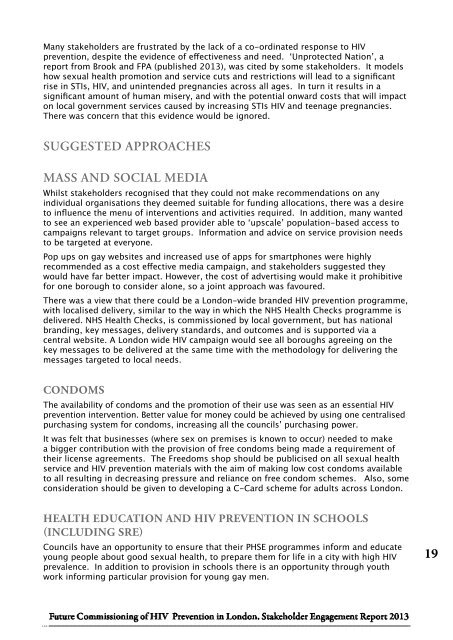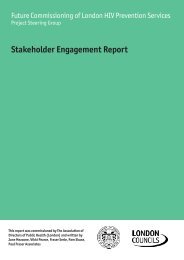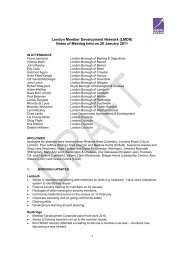Stakeholder Engagement Report - London Councils
Stakeholder Engagement Report - London Councils
Stakeholder Engagement Report - London Councils
You also want an ePaper? Increase the reach of your titles
YUMPU automatically turns print PDFs into web optimized ePapers that Google loves.
Many stakeholders are frustrated by the lack of a co-ordinated response to HIV<br />
prevention, despite the evidence of effectiveness and need. ‘Unprotected Nation’, a<br />
report from Brook and FPA (published 2013), was cited by some stakeholders. It models<br />
how sexual health promotion and service cuts and restrictions will lead to a significant<br />
rise in STIs, HIV, and unintended pregnancies across all ages. In turn it results in a<br />
significant amount of human misery, and with the potential onward costs that will impact<br />
on local government services caused by increasing STIs HIV and teenage pregnancies.<br />
There was concern that this evidence would be ignored.<br />
Suggested approaches<br />
Mass and social media<br />
Whilst stakeholders recognised that they could not make recommendations on any<br />
individual organisations they deemed suitable for funding allocations, there was a desire<br />
to influence the menu of interventions and activities required. In addition, many wanted<br />
to see an experienced web based provider able to ‘upscale’ population-based access to<br />
campaigns relevant to target groups. Information and advice on service provision needs<br />
to be targeted at everyone.<br />
Pop ups on gay websites and increased use of apps for smartphones were highly<br />
recommended as a cost effective media campaign, and stakeholders suggested they<br />
would have far better impact. However, the cost of advertising would make it prohibitive<br />
for one borough to consider alone, so a joint approach was favoured.<br />
There was a view that there could be a <strong>London</strong>-wide branded HIV prevention programme,<br />
with localised delivery, similar to the way in which the NHS Health Checks programme is<br />
delivered. NHS Health Checks, is commissioned by local government, but has national<br />
branding, key messages, delivery standards, and outcomes and is supported via a<br />
central website. A <strong>London</strong> wide HIV campaign would see all boroughs agreeing on the<br />
key messages to be delivered at the same time with the methodology for delivering the<br />
messages targeted to local needs.<br />
Condoms<br />
The availability of condoms and the promotion of their use was seen as an essential HIV<br />
prevention intervention. Better value for money could be achieved by using one centralised<br />
purchasing system for condoms, increasing all the councils’ purchasing power.<br />
It was felt that businesses (where sex on premises is known to occur) needed to make<br />
a bigger contribution with the provision of free condoms being made a requirement of<br />
their license agreements. The Freedoms shop should be publicised on all sexual health<br />
service and HIV prevention materials with the aim of making low cost condoms available<br />
to all resulting in decreasing pressure and reliance on free condom schemes. Also, some<br />
consideration should be given to developing a C-Card scheme for adults across <strong>London</strong>.<br />
Health Education and HIV Prevention in Schools<br />
(including SRE)<br />
<strong>Councils</strong> have an opportunity to ensure that their PHSE programmes inform and educate<br />
young people about good sexual health, to prepare them for life in a city with high HIV<br />
prevalence. In addition to provision in schools there is an opportunity through youth<br />
work informing particular provision for young gay men.<br />
19




